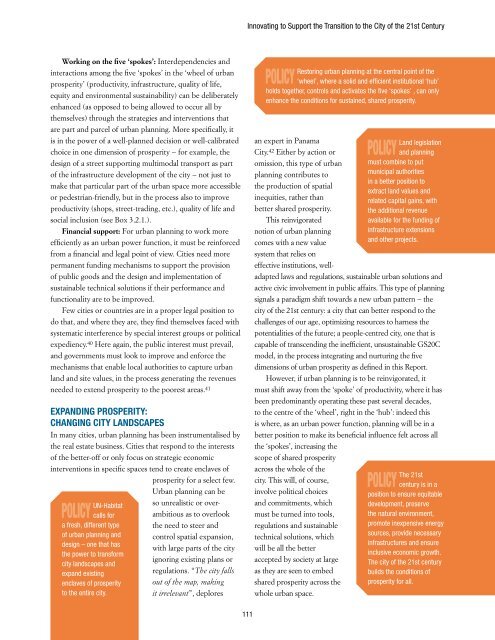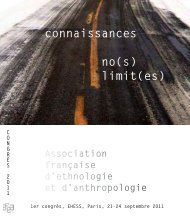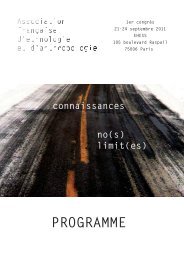state of the world's cities 2012/2013 - United Nations Sustainable ...
state of the world's cities 2012/2013 - United Nations Sustainable ...
state of the world's cities 2012/2013 - United Nations Sustainable ...
You also want an ePaper? Increase the reach of your titles
YUMPU automatically turns print PDFs into web optimized ePapers that Google loves.
Innovating to Support <strong>the</strong> Transition to <strong>the</strong> City <strong>of</strong> <strong>the</strong> 21st CenturyWorking on <strong>the</strong> five ‘spokes’: Interdependencies andinteractions among <strong>the</strong> five ‘spokes’ in <strong>the</strong> ‘wheel <strong>of</strong> urbanprosperity’ (productivity, infrastructure, quality <strong>of</strong> life,equity and environmental sustainability) can be deliberatelyenhanced (as opposed to being allowed to occur all by<strong>the</strong>mselves) through <strong>the</strong> strategies and interventions thatare part and parcel <strong>of</strong> urban planning. More specifically, itis in <strong>the</strong> power <strong>of</strong> a well-planned decision or well-calibratedchoice in one dimension <strong>of</strong> prosperity − for example, <strong>the</strong>design <strong>of</strong> a street supporting multimodal transport as part<strong>of</strong> <strong>the</strong> infrastructure development <strong>of</strong> <strong>the</strong> city − not just tomake that particular part <strong>of</strong> <strong>the</strong> urban space more accessibleor pedestrian-friendly, but in <strong>the</strong> process also to improveproductivity (shops, street-trading, etc.), quality <strong>of</strong> life andsocial inclusion (see Box 3.2.1.).Financial support: For urban planning to work moreefficiently as an urban power function, it must be reinforcedfrom a financial and legal point <strong>of</strong> view. Cities need morepermanent funding mechanisms to support <strong>the</strong> provision<strong>of</strong> public goods and <strong>the</strong> design and implementation <strong>of</strong>sustainable technical solutions if <strong>the</strong>ir performance andfunctionality are to be improved.Few <strong>cities</strong> or countries are in a proper legal position todo that, and where <strong>the</strong>y are, <strong>the</strong>y find <strong>the</strong>mselves faced withsystematic interference by special interest groups or politicalexpediency. 40 Here again, <strong>the</strong> public interest must prevail,and governments must look to improve and enforce <strong>the</strong>mechanisms that enable local authorities to capture urbanland and site values, in <strong>the</strong> process generating <strong>the</strong> revenuesneeded to extend prosperity to <strong>the</strong> poorest areas. 41Expanding Prosperity:Changing City LandscapesIn many <strong>cities</strong>, urban planning has been instrumentalised by<strong>the</strong> real e<strong>state</strong> business. Cities that respond to <strong>the</strong> interests<strong>of</strong> <strong>the</strong> better-<strong>of</strong>f or only focus on strategic economicinterventions in specific spaces tend to create enclaves <strong>of</strong>prosperity for a select few.Urban planning can beso unrealistic or overambitiousas to overlookpolicy UN-Habitatcalls fora fresh, different type <strong>the</strong> need to steer and<strong>of</strong> urban planning and control spatial expansion,design – one that haswith large parts <strong>of</strong> <strong>the</strong> city<strong>the</strong> power to transformignoring existing plans orcity landscapes andexpand existingregulations. “The city fallsenclaves <strong>of</strong> prosperity out <strong>of</strong> <strong>the</strong> map, makingto <strong>the</strong> entire city.it irrelevant”, deplorespolicyRestoring urban planning at <strong>the</strong> central point <strong>of</strong> <strong>the</strong>‘wheel’, where a solid and efficient institutional ‘hub’holds toge<strong>the</strong>r, controls and activates <strong>the</strong> five ‘spokes’ , can onlyenhance <strong>the</strong> conditions for sustained, shared prosperity.policyan expert in PanamaLand legislationCity. 42 Ei<strong>the</strong>r by action orand planningomission, this type <strong>of</strong> urban must combine to putplanning contributes tomunicipal authoritiesin a better position to<strong>the</strong> production <strong>of</strong> spatialextract land values andinequities, ra<strong>the</strong>r thanrelated capital gains, withbetter shared prosperity.<strong>the</strong> additional revenueThis reinvigoratedavailable for <strong>the</strong> funding <strong>of</strong>notion <strong>of</strong> urban planninginfrastructure extensionscomes with a new valueand o<strong>the</strong>r projects.system that relies oneffective institutions, welladaptedlaws and regulations, sustainable urban solutions andactive civic involvement in public affairs. This type <strong>of</strong> planningsignals a paradigm shift towards a new urban pattern − <strong>the</strong>city <strong>of</strong> <strong>the</strong> 21st century: a city that can better respond to <strong>the</strong>challenges <strong>of</strong> our age, optimizing resources to harness <strong>the</strong>potentialities <strong>of</strong> <strong>the</strong> future; a people-centred city, one that iscapable <strong>of</strong> transcending <strong>the</strong> inefficient, unsustainable GS20Cmodel, in <strong>the</strong> process integrating and nurturing <strong>the</strong> fivedimensions <strong>of</strong> urban prosperity as defined in this Report.However, if urban planning is to be reinvigorated, itmust shift away from <strong>the</strong> ‘spoke’ <strong>of</strong> productivity, where it hasbeen predominantly operating <strong>the</strong>se past several decades,to <strong>the</strong> centre <strong>of</strong> <strong>the</strong> ‘wheel’, right in <strong>the</strong> ‘hub’: indeed thisis where, as an urban power function, planning will be in abetter position to make its beneficial influence felt across all<strong>the</strong> ‘spokes’, increasing <strong>the</strong>scope <strong>of</strong> shared prosperityacross <strong>the</strong> whole <strong>of</strong> <strong>the</strong>The 21stcity. This will, <strong>of</strong> course,policy century is in ainvolve political choicesposition to ensure equitableand commitments, whichdevelopment, preservemust be turned into tools, <strong>the</strong> natural environment,regulations and sustainable promote inexpensive energysources, provide necessarytechnical solutions, whichinfrastructures and ensurewill be all <strong>the</strong> betterinclusive economic growth.accepted by society at large The city <strong>of</strong> <strong>the</strong> 21st centuryas <strong>the</strong>y are seen to embed builds <strong>the</strong> conditions <strong>of</strong>shared prosperity across <strong>the</strong> prosperity for all.whole urban space.111





